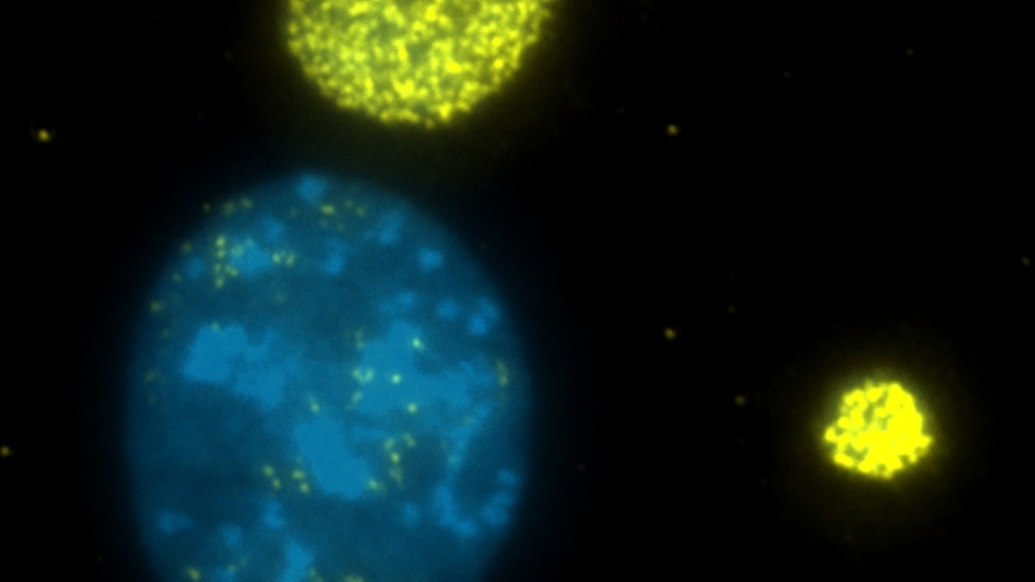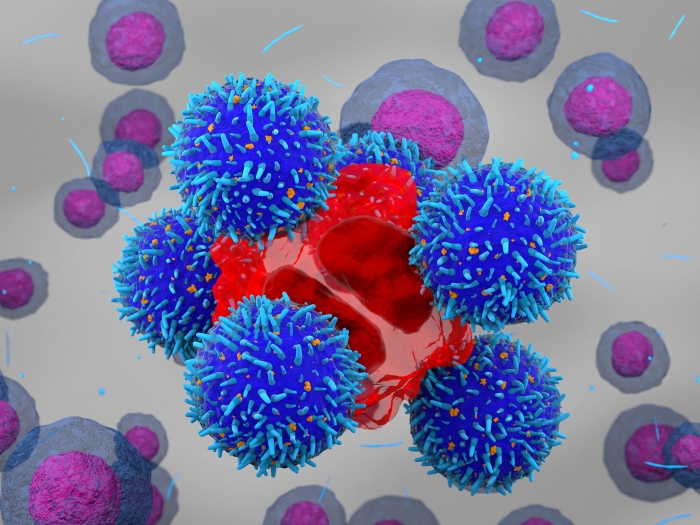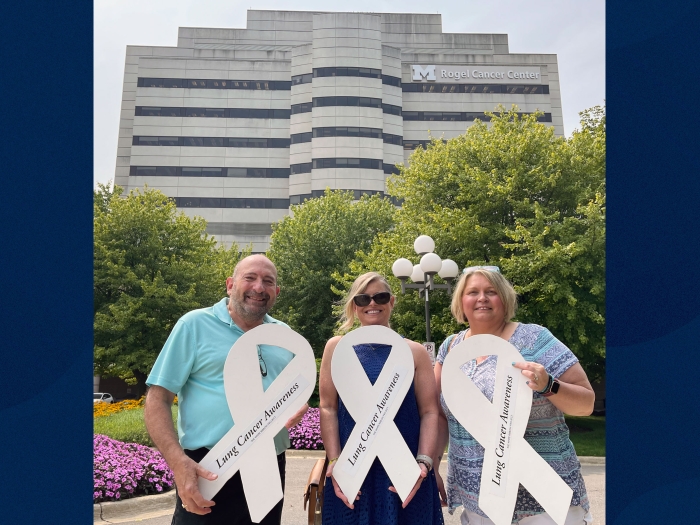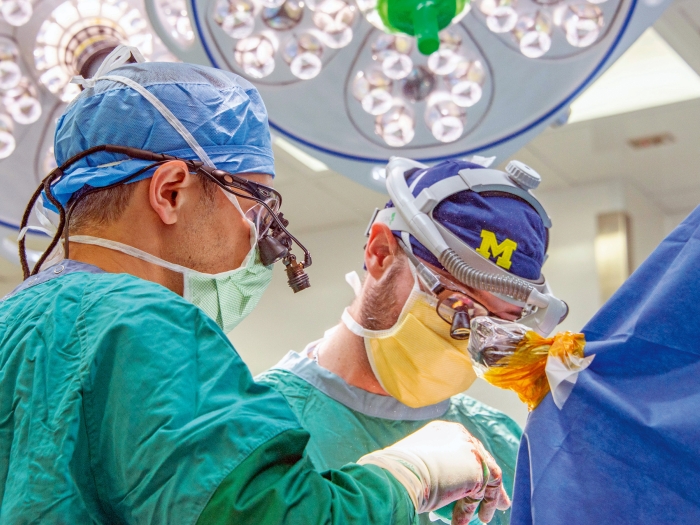In mouse models and serum samples, an FDA-approved drug that lowers ammonia levels made the tumors more sensitive to treatment.
5:00 AM
Author |

High levels of ammonia in tumors leads to fewer T cells and immunotherapy resistance in mouse models of colorectal cancer, new findings from the University of Michigan Rogel Cancer Center revealed. Researchers found that ammonia inhibits the growth and function of T cells, which are vital for anti-tumor immunity. The findings appear in Cell Metabolism.
“We identified the mechanism of how ammonia dysregulates T cell function and showed that reducing ammonia levels using FDA-approved drugs for hyperammonemia can reduce tumor size in several different models including metastatic colorectal cancer,” says Hannah Bell, Ph.D., a postdoctoral fellow in cancer biology and author on this paper. “Use of this drug also synergizes with immunotherapy. If you treat the mice with immunotherapy when you also treat them with this ammonia reducing agent, you're able to sensitize the tumors to treatment.”
MORE FROM THE LAB: Subscribe to our weekly newsletter
“Most colorectal cancers are insensitive to immune therapies,” adds Yatrik Shah, Ph.D., Horace W. Davenport Collegiate Professor of Physiology and first author of the study. “We’ve found that one of the mechanisms that leads to this resistance is likely the high level of ammonia that accumulates in the microenvironment.”
Bell explains that while there are many factors that contribute to immunotherapy resistance, there are few therapeutic interventions that can reactivate therapy sensitivity. “Our study shows that this is a relatively safe and FDA-approved method that could work alongside immunotherapy to make treatment more effective for patients. This new method provides a potentially direct avenue to treat tumors and reactivate the immune system.”
How does ammonia accumulate in colorectal tumors in the first place? Ammonia levels are regulated by a balance of production and cellular detoxification. Most ammonia is generated by the microbiota, but Bell and Shah’s work suggests that increased production of ammonia is not what results in accumulation. “Our work demonstrates that tumors have lost the ability to detoxify ammonia leading to build up,” said Shah.
Further, the accumulation of ammonia is likely not isolated to just colorectal tumors. Shah says this discovery may open doors in explaining resistance to other cancer types as well. “Only about 20-30% of all cancer patients are sensitive to immunotherapy. 70% of patients don’t derive any benefit from it,” Shah said. “Now, we have a mechanism that could explain this resistance in tumors beyond colon cancer.”
More work needs to be done before researchers can bring these findings into the clinic.
Additional Authors: Amanda K. Huber; Rashi Singhal; Navyateja Korimerla; Ryan J. Rebernick; Roshan Kumar; Marwa O. El-derany; Peter Sajjakulnukit; Nupur K. Das; Samuel A. Kerk; Sumeet Solanki; Jadyn G. James; Donghwan Kim; Li Zhang; Brandon Chen; Rohit Mehra; Timothy L. Frankel; Balázs Győrffy; Eric R. Fearon; Marina Pasca di Magliano; Frank J. Gonzalez; Ruma Banerjee; Daniel R. Wahl; Costas A. Lyssiotis; Michael Green
COI: N/A
Live your healthiest life: Get tips from top experts weekly. Subscribe to the Michigan Health blog newsletter
Headlines from the frontlines: The power of scientific discovery harnessed and delivered to your inbox every week. Subscribe to the Michigan Health Lab blog newsletter
Like Podcasts? Add the Michigan Medicine News Break on Spotify, Apple Podcasts or anywhere you listen to podcasts.
Additional Authors: Amanda K. Huber; Rashi Singhal; Navyateja Korimerla; Ryan J. Rebernick; Roshan Kumar; Marwa O. El-derany; Peter Sajjakulnukit; Nupur K. Das; Samuel A. Kerk; Sumeet Solanki; Jadyn G. James; Donghwan Kim; Li Zhang; Brandon Chen; Rohit Mehra; Timothy L. Frankel; Balázs Győrffy; Eric R. Fearon; Marina Pasca di Magliano; Frank J. Gonzalez; Ruma Banerjee; Daniel R. Wahl; Costas A. Lyssiotis; Michael Green
Funding: NIH grants: R01CA148828, R01CA245546, R01DK095201, R37CA237421, R01CA248160, R01CA244931 (C.A.L); UMCCC Core Grant P30CA046592 and R35GM130183; T32 training grant GM008322 and F30CA257292. American Heart Association (826245) and NIH grant F30CA257292. NIH F31 fellowship (F31CA247457) and NIH fellowship (F99CA264414).CMB Graduate Program T32GM007315. American Physiological Society postdoctoral fellowship (032650). Crohn’s and Colitis Foundation Research fellowship award (623914) and the American Heart Association postdoctoral fellowship (19POST34380588). National Research, Development and Innovation Office (PharmaLab, RRF-2.3.1-21-2022-00015 and 2020-1.1.6-JÖVŐ-2021-00013).
DOI: “Microenvironmental ammonia enhances T cell exhaustion in colorectal cancer,” Cell Metabolism. DOI: 10.1172/JCI143691

Explore a variety of health care news & stories by visiting the Health Lab home page for more articles.

Department of Communication at Michigan Medicine
Want top health & research news weekly? Sign up for Health Lab’s newsletters today!





